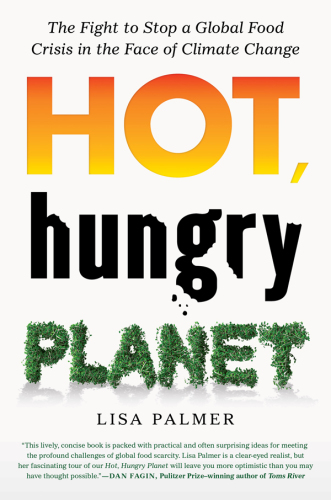
Hot, Hungry Planet
The Fight to Stop a Global Food Crisis in the Face of Climate Change
کتاب های مرتبط
- اطلاعات
- نقد و بررسی
- دیدگاه کاربران
نقد و بررسی

March 1, 2017
Accelerating climate change and the population explosion do not bode well for food security. Good crop yields usually depend on consistent weather, and we are not getting food to everyone. Journalist and researcher Palmer warns that the global food system is losing resilience and cites as one example rising prices that have caused social disruption in the Middle East. She has traveled the world examining a variety of efforts to prepare farming for a challenging future, such as secondary schooling and family planning for young farm women in Uganda; combined ranching, farming, and forestry practiced on properties in Colombia; and "Climate Smart" Indian villages using systems engineering techniques. She also looks at the cross-breeding of weeds with rice plants to increase hardiness by the U.S. Department of Agriculture; the purchase of boats for women fish sellers on Lake Victoria, Kenya; and sustainable small-scale U.S. farming. Palmer concludes that there is no single solution but stresses that education, appropriate technology, and female empowerment are key components. The shifts between scenarios can be confusing at times, but overall the reporting delivers welcome hope that humans may avoid famine in the face of climate change. VERDICT For readers with an interest in agriculture and the environment.--David R. Conn, formerly with Surrey Libs., BC
Copyright 2017 Library Journal, LLC Used with permission.

April 1, 2017
Palmer, a journalist and public-policy scholar, traveled the world to uncover the connections between looming global food shortages and the practices that are causing global warming. Today one in six people worldwide goes to bed hungry because food is too expensive or not available. The earth's human population will exceed 9.6 billion by 2050. What will all those people eat? Certainly, they will need to consume less meat: 12 pounds of grain are needed to produce one pound of beef. Palmer illuminates the cruel choices food crises force upon women, including female fish sellers who are forced to have sex with the men who bring the catch of the day in order to feed their families, even at the risk of contracting HIV. Palmer also explains the dire consequences of a growing global middle class that is hungering for more meat and dairy and the ecological folly of the ongoing clearing of grasslands and forests to graze cattle and grow oil palm trees. But she also sees hope in new and diverse economic opportunities based on restoring and nurturing the environment.(Reprinted with permission of Booklist, copyright 2017, American Library Association.)

























دیدگاه کاربران